Frozen assets may not beat the biological clock
Updated: 2015-07-29 11:23
By Shan Juan(China Daily USA)
|
||||||||
An increasing number of Chinese women are choosing to have children later in life, but experts are warning that postponing pregnancy can lead to a host of problems and are urging potential mothers to think carefully before opting for techniques such as egg freezing, as Shan Juan reports.
Liu Feiyu is planning a trip to Saipan. She'll stay for five nights, but it will be nothing like her previous visit to the US-administered tropical island resort, which was purely for fun. "This time, it'll be an egg freezing adventure," the 35-year-old said.
Liu, marketing director of the Beijing branch of a Belgian multinational, divorced last year. She's now in a relationship, but is wary of committing too quickly. "I won't marry until I'm 100 percent sure he's 'the one'. But my biological clock, especially my fertility, may not be able to wait long enough to allow an easy conception or a healthy baby," she said.
Inspired by Xu Jinglei, a 41-year-old Chinese actress who stored her eggs at a clinic in the US to extend her fertility, Liu spoke to a number of local clinics to investigate Oocyte Cryopreservation, or egg freezing, but was turned away because she's unmarried.
During egg freezing, young, unfertilized eggs are harvested from the ovaries, then frozen and stored for later use. Eggs can be thawed, fertilized by sperm in a lab and implanted in the uterus via in vitro fertilization techniques. The uterus ages quite slowly and healthy ones can nurture a fetus even if the woman has already been through the menopause.
Liu's problem is that egg freezing is classified as a supplementary IVF measure in China, and the procedure is only available to married women. The women must also have a valid reproduction permit, as stipulated by the Assisted Reproductive Technology Regulation issued by the National Health and Family Planning Commission, the country's top health body.
The only exceptions are women with conditions such as premature ovarian failure, or those undergoing chemoradiation therapy for cancer. Freezing eggs solely for the purpose of preserving or extending fertility is illegal, the regulation states.
Tormented by rejection
"I couldn't sleep after the clinics rejected me. I was tormented by the idea that I would probably be incapable of producing healthy eggs as I got older," Liu said. "I'm longing for a family, a child of my own, but I'm not sure when."
Online research led her to Baobaole, or "Baby Baby Happiness", an agency that introduces Chinese couples and single women to fertility centers in the US and Thailand, where egg-freezing services are freely available. The agency has offices in major Chinese cities such as Beijing, Shanghai, Guangzhou in Guangdong province, and Changchun, the capital of Jilin province.
Liu spent days weighing the pros and cons of traveling to Saipan. One of the main stumbling blocks was the cost; in China, the treatment costs less than 15,000 yuan ($2,452). That's a fraction of the 170,000-yuan price tag for the agency's six-day package, which includes preparatory procedures, such as medical checks in Beijing, round-trip airfare, egg retrieval, five nights at a hotel, and a year's storage of the eggs. On average, six to 12 eggs are retrieved for freezing.
If the eggs are stored for longer than 12 months, further storage costs $5,000 per year, and there will be extra charges for thawing the eggs and IVF treatment, according to a Baobaole customer manager surnamed Feng.
"Demand for purely egg-freezing services has risen substantially in recent years, but it's still a small part of our business. Most of our work involves IVF, surrogacy and gender selection," he said.
Qin Lang, a physician at the Reproductive Medical Center of the West China Second University Hospital, a top-flight fertility center in Chengdu, Sichuan province, said a growing number of women share Liu's plight.
"We've seen a sharp rise in requests for egg freezing from single women, mostly working women from large cities, but the government's rules mean we have to turn them down," said Qin, whose center performs more than 5,000 IVF treatments every year, and is ranked in the top five of the 356 fertility centers licensed by the NHFPC.
Ethics and eggs
Ethical concerns mean reproductive medicine is heavily regulated in China. For more than 30 years, the national family planning policy limited most couples to one child, and boys were favored over girls. Surrogacy and trading in ova are also illegal. As a result, egg freezing is highly regulated, and is not available to single women who want to prolong fertility.
Qin sympathized with Liu's predicament. "When it comes to fertility issues, it's the age of the egg that matters most," he said.
Compared with the freezing of sperm and embryos, which started in the 1960s, egg freezing has only been widely practiced since 1986, and is technically more complicated.
The American Society for Reproductive Medicine lifted the "experimental" label from the procedure in 2012, but it stressed the move should not be seen as encouraging healthy women to freeze their eggs to postpone childbearing.
Qin echoed the ASRM: "Marketing the procedure simply as a way to defer childbearing may give women false hopes."
The quality and quantity of the eggs begin to decline when women enter their 20s, but really significant deterioration happens after age 37. So, as a woman ages, it becomes increasingly difficult, and eventually impossible, for her to conceive naturally.
"To look good, women can go for plastic surgery. They can never stop the biological clock, though," Qin said, adding that he regards 23 to 28 is the ideal childbearing age range.
Mu Guangzong, a demographics expert at Peking University, said Chinese women are starting their sex lives at a younger age, but they are getting married and having children later in life.
Statistics from the latest census show that the average age of first-time mothers was 28 in 2010, two years older than the average age a decade before.
Sun Aijun, a senior gynecologist at the Peking Union Medical College Hospital, said the postponement trend has contributed to a rise in infertility. Moreover, NHFPC statistics show that at least 10 percent of Chinese women of childbearing age are infertile, more than double the figure in the 1990s.
In addition, postponing childbearing increases the health risks to both mother and baby.
"As a doctor, I feel sorry to see childbearing postponed as a result of women's liberation. They pursue careers and money at the price of missing their reproductive prime," Sun said. Infertility has led many couples to turn to IVF, which has a success rate of 40 to 50 percent. "For women older than 35, the rate is even lower," he said.
The long wait
Feng Li rues her failure to have a baby earlier in life. "Now, it's too late," the married 30-year-old said.
Like her mother, Feng Li had premature ovarian failure, and both women went through the menopause at age 29. However, her mother gave birth at age 26.
Feng Li and her husband, who both work low-paid temporary jobs in Beijing, long to have a child. They are waiting for an egg to be provided by a donor, but the process is time-consuming because the regulations stipulate that ova can only be donated by women undergoing IVF treatment. In extreme cases, couples have waited 10 years.
"All I can do is to wait. We can't afford treatment overseas, where it's much easier to obtain donated eggs. Because of my special circumstances, I could have frozen my eggs at a younger age, but I missed out," said Feng Li, who hadn't realized she could fall prey to the same condition as her mother.
Sun urged women to be aware of their ovarian health and plan on having children as early as they can, based on their fertility, which can be determined by a blood test that measures the level of Anti-Mullerian hormone, a protein that indicates ovarian function.
He said egg freezing could help single women with declining ovarian function, but warned: "Freezing the eggs could be an option, but it's not like your fertility is in a safe."
According to Qin Lang, the physician, health experts have long regarded egg freezing as an experimental procedure, and the success rate is lower than for procedures such as embryo freezing or the use of fresh donor eggs. On average, about 80 percent of eggs can be used after thawing.
Again, age matters. International studies indicate that the odds of successful treatment are higher if the women are young when they freeze their eggs.
The process involves time, money and discomfort, he added. Women using egg-freezing services undergo ovarian hyperstimulation to prompt egg development. Additionally, egg retrieval can cause pain and infection in the pelvis and abdomen, and injury to the bladder, bowels and blood vessels.
The potential discomfort hasn't deterred Liu. "Do the right thing at the right time and don't paint yourself into a corner," she said.
Ahead of her trip to Saipan, she admitted she's apprehensive about the egg-retrieval process, during which physicians use ultrasound to guide a long needle through the vaginal wall and into the ovary.
"They told me: 'Don't worry, it's just a half-hour outpatient procedure'. But I know that it will be the longest half-hour of my life," she said. "I can't give up, though, it's my last hope."
Contact the writer at shanjuan@chinadaily.com.cn
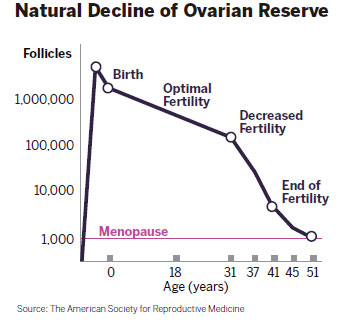
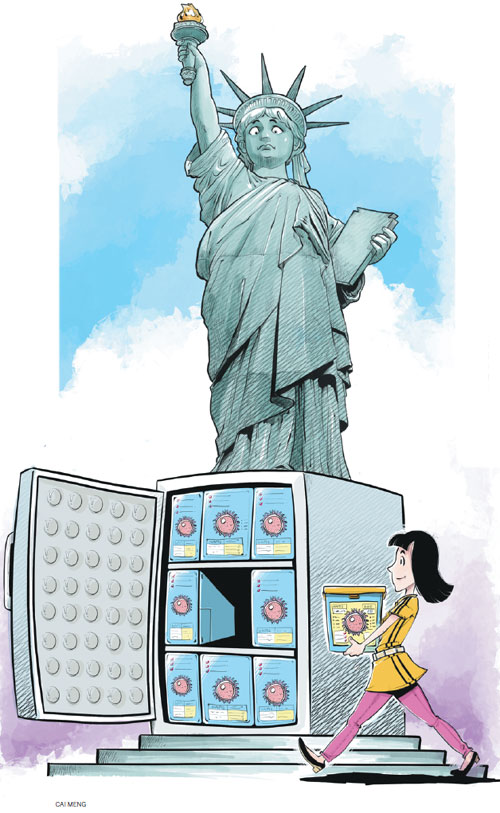
(China Daily USA 07/29/2015 page6)

 World's largest radio telescope being built
World's largest radio telescope being built Elvis Festival pays tribute to the King of Rock 'n' Roll
Elvis Festival pays tribute to the King of Rock 'n' Roll
 Four-color rice turns paddy field into artwork
Four-color rice turns paddy field into artwork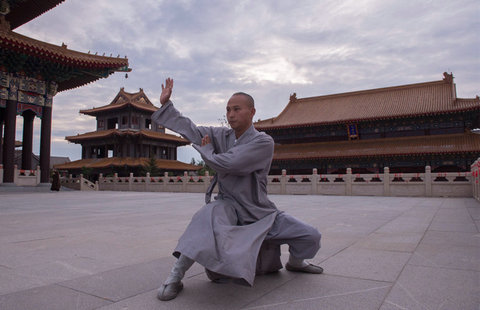
 Images capture modern life of a warrior monk
Images capture modern life of a warrior monk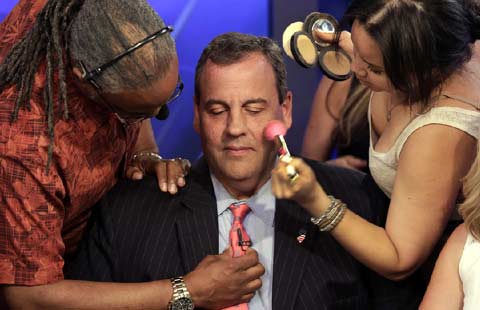
 The world in photos: July 20 - 26
The world in photos: July 20 - 26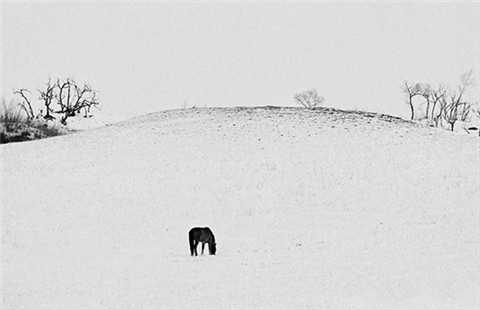
 Amazing landscape of China in white and black
Amazing landscape of China in white and black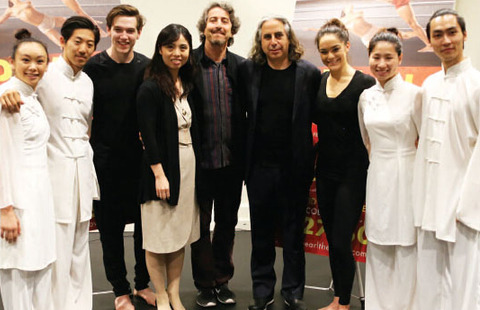
 Across America over the week (July 17- July 23)
Across America over the week (July 17- July 23)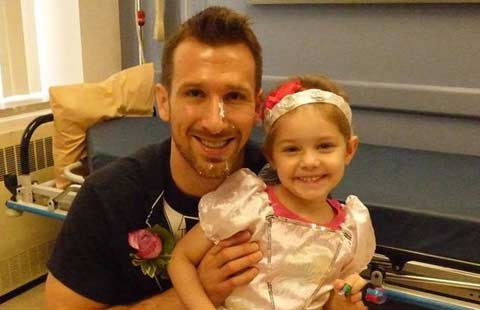
 Unusual but true: 'Love' conquers all
Unusual but true: 'Love' conquers all
Most Viewed
Editor's Picks

|

|

|

|

|

|
Today's Top News
Beijing condemns Somali attack, mourns deaths
Panda 'fakes pregnancy' to get better living conditions
China eyes deepened cooperation with overseas NGOs
Monster Hunt breaks Chinese box office record
Olympic bid panel cites city's merits
Astronomers discover most Earth-like planet yet
Seattle Chinatown leader killed in shooting
Flight details of Obama's Kenya trip leaked
US Weekly

|

|






